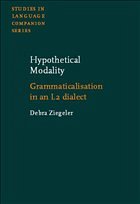Main description:
This book marks a new development in the field of grammaticalisation studies, in that it extends the field of grammaticalisation studies from relatively homogeneous languages to those possessing well-established and institutionalised second language varieties. In Hypothetical Modality, special reference is made to Singaporean English, a native-speaker L2 dialect of considerable importance in the South-East Asian region, and to the expression in the dialect of hypothetical modality, which appears to be indistinguishable from non-hypothetical modality in terms of the use of preterite or past forms of modal verbs. Within a grammaticalisation
framework, a number of factors can be seen to be relevant to an explanation, including substratum and contact features such as tense/aspect marking, levels of lexical retention as an individual (psychological) phenomenon, and the fact that such dialects have a discontinuity in their development. In addition, the book defines pragmatic approaches to the understanding of hypothetical modality, in both diachronic and synchronic terms.
Table of contents:
- Preamble
- Preface
- Abbreviations
- List of Figures
- List of Tables
- 1. Introduction.
- 2. Hypothetical modality as a grammatical category
- 3. A diachronic corpus study of would
- 4. Singaporean English and substratum influences in the grammaticalisation of hypothetical modality
- 5. The interaction of tense and aspect in the grammaticalisation of counterfactuality
- 6. Hypothetical WILL: A study in retention
- 7. The Lexical Memory Traces Hypothesis
- 8. Conclusions
- Appendices
- Appendix 1: Chapter 6 Questionnaire
- Appendix 2: Chapter 6 Control Questionnaire
- Bibliography
- Selected bibliography
- Primary sources
- Name Index
- Subject Index
This book marks a new development in the field of grammaticalisation studies, in that it extends the field of grammaticalisation studies from relatively homogeneous languages to those possessing well-established and institutionalised second language varieties. In Hypothetical Modality, special reference is made to Singaporean English, a native-speaker L2 dialect of considerable importance in the South-East Asian region, and to the expression in the dialect of hypothetical modality, which appears to be indistinguishable from non-hypothetical modality in terms of the use of preterite or past forms of modal verbs. Within a grammaticalisation
framework, a number of factors can be seen to be relevant to an explanation, including substratum and contact features such as tense/aspect marking, levels of lexical retention as an individual (psychological) phenomenon, and the fact that such dialects have a discontinuity in their development. In addition, the book defines pragmatic approaches to the understanding of hypothetical modality, in both diachronic and synchronic terms.
Table of contents:
- Preamble
- Preface
- Abbreviations
- List of Figures
- List of Tables
- 1. Introduction.
- 2. Hypothetical modality as a grammatical category
- 3. A diachronic corpus study of would
- 4. Singaporean English and substratum influences in the grammaticalisation of hypothetical modality
- 5. The interaction of tense and aspect in the grammaticalisation of counterfactuality
- 6. Hypothetical WILL: A study in retention
- 7. The Lexical Memory Traces Hypothesis
- 8. Conclusions
- Appendices
- Appendix 1: Chapter 6 Questionnaire
- Appendix 2: Chapter 6 Control Questionnaire
- Bibliography
- Selected bibliography
- Primary sources
- Name Index
- Subject Index

